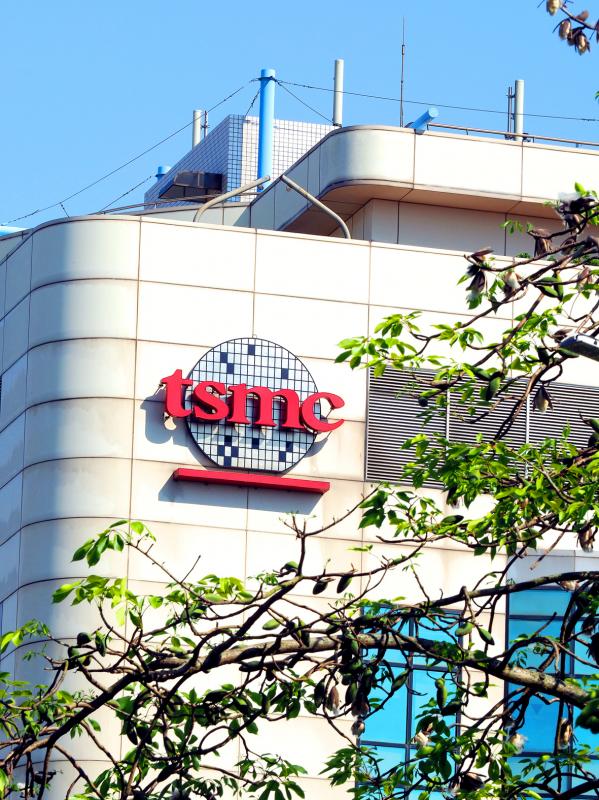Taiwan Semiconductor Manufacturing Co (TSMC, 台積電) yesterday raised its planned capital expenditure for this year to top US$17 billion, from an original budget of US$15 billion to US$16 billion, as 5G infrastructure deployment and high-computing-performance applications (HPC) drive demand for advanced technologies.
The world’s biggest contract chipmaker also revised up its revenue growth forecast for this year to 20 percent, outpacing the foundry industry’s forecast growth of mid-to-high-teens percent and the overall semiconductor industry’s expected “slight” growth.
In April, TSMC forecast that its revenue would grow by 15 to 19 percent this year.

Photo: David Chang, EPA-EFE
Due to the US’ restrictions on exports containing US technologies to China’s Huawei Technologies Co (華為), TSMC said it has since May 15 stopped taking new orders from its second-biggest customer after Apple Inc.
TSMC has no plans to ship wafers to Huawei after Sept. 15 as Washington has not made a final decision yet, it added.
Asked whether TSMC would be able to fill its 5-nanometer capacity after losing Huawei’s orders, TSMC chief executive officer C.C. Wei (魏哲家) told an earnings conference: “We should have no problem.”
The company is working closely with customers to fill up the vacuum left by Huawei, Wei said.
Its clients are preparing for 5G and HPC applications, as well as trying to ensure supply security in light of the COVID-19 uncertainty, he said.
The US ban does not include shipments of standard products to Huawei, TSMC chairman Mark Liu (劉德音) said, adding that Huawei might shift strategy “by procuring general-purpose products.”
On Wednesday, market researcher Omdia said that Huawei might replace smartphone chips designed by its semiconductor unit Hisilicon Technologies Co (海思) with those designed by MediaTek Inc (聯發科) for general use, rather than customized for Huawei.
MediaTek is also a customer of TSMC.
TSMC reported a record net profit of NT$120.82 billion (US$4.08 billion) for last quarter, up 81 percent from NT$66.77 billion a year ago and an increase of 3.3 percent from NT$116.99 billion in the previous quarter.
Earnings per share rose to NT$4.66 from NT$2.57 a year earlier and NT$4.51 in the prior quarter.
“Moving into the third quarter of 2020, we expect our businesses to be supported by strong demand for our industry-leading 5-nanometer and 7-nanometer technologies, driven by 5G smartphones, HPC and IoT [Internet of things]-related applications,” Wei said.
Revenue is forecast to rise between 7.32 and 9.74 percent to US$11.2 billion and US$11.5 billion this quarter, from US$10.38 billion last quarter, the company said.
However, gross margin is expected to drop to between 50 and 52 percent this quarter from 53 percent last quarter, it said.

Semiconductor business between Taiwan and the US is a “win-win” model for both sides given the high level of complementarity, the government said yesterday responding to tariff threats from US President Donald Trump. Home to the world’s largest contract chipmaker, Taiwan Semiconductor Manufacturing Co (TSMC, 台積電), Taiwan is a key link in the global technology supply chain for companies such as Apple Inc and Nvidia Corp. Trump said on Monday he plans to impose tariffs on imported chips, pharmaceuticals and steel in an effort to get the producers to make them in the US. “Taiwan and the US semiconductor and other technology industries

A start-up in Mexico is trying to help get a handle on one coastal city’s plastic waste problem by converting it into gasoline, diesel and other fuels. With less than 10 percent of the world’s plastics being recycled, Petgas’ idea is that rather than letting discarded plastic become waste, it can become productive again as fuel. Petgas developed a machine in the port city of Boca del Rio that uses pyrolysis, a thermodynamic process that heats plastics in the absence of oxygen, breaking it down to produce gasoline, diesel, kerosene, paraffin and coke. Petgas chief technology officer Carlos Parraguirre Diaz said that in

SMALL AND EFFICIENT: The Chinese AI app’s initial success has spurred worries in the US that its tech giants’ massive AI spending needs re-evaluation, a market strategist said Chinese artificial intelligence (AI) start-up DeepSeek’s (深度求索) eponymous AI assistant rocketed to the top of Apple Inc’s iPhone download charts, stirring doubts in Silicon Valley about the strength of the US’ technological dominance. The app’s underlying AI model is widely seen as competitive with OpenAI and Meta Platforms Inc’s latest. Its claim that it cost much less to train and develop triggered share moves across Asia’s supply chain. Chinese tech firms linked to DeepSeek, such as Iflytek Co (科大訊飛), surged yesterday, while chipmaking tool makers like Advantest Corp slumped on the potential threat to demand for Nvidia Corp’s AI accelerators. US stock

SUBSIDIES: The nominee for commerce secretary indicated the Trump administration wants to put its stamp on the plan, but not unravel it entirely US President Donald Trump’s pick to lead the agency in charge of a US$52 billion semiconductor subsidy program declined to give it unqualified support, raising questions about the disbursement of funds to companies like Intel Corp and Taiwan Semiconductor Manufacturing Co (台積電). “I can’t say that I can honor something I haven’t read,” Howard Lutnick, Trump’s nominee for commerce secretary, said of the binding CHIPS and Science Act awards in a confirmation hearing on Wednesday. “To the extent monies have been disbursed, I would commit to rigorously enforcing documents that have been signed by those companies to make sure we get